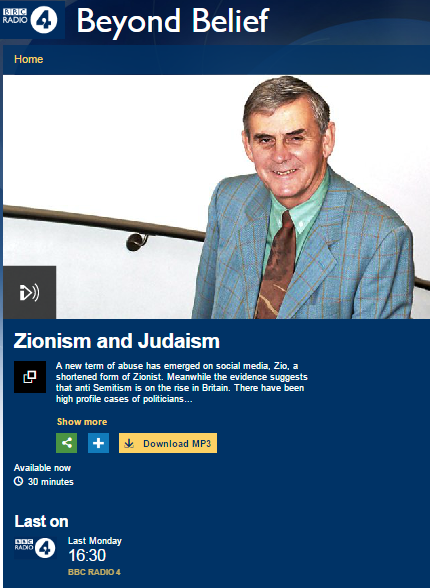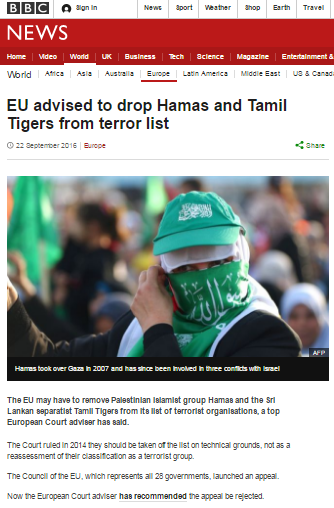A common feature of accepted definitions of antisemitism is their recognition of the denial of the right of the Jewish people to self-determination as a form of antisemitism.
For example:
The US State Department definition of antisemitism:
“Denying the Jewish people their right to self-determination, and denying Israel the right to exist”.
The EUMC working definition of antisemitism (used in the UK by the All Party Parliamentary Group Against Antisemitism and in the College of Policing Hate Crime Operational Guidance (2014))
“Denying the Jewish people their right to self-determination, e.g., by claiming that the existence of a State of Israel is a racist endeavor.”
The International Holocaust Remembrance Alliance (IHRA) definitionof antisemitism:
“Denying the Jewish people their right to self-determination, e.g., by claiming that the existence of a State of Israel is a racist endeavor.”
As regular readers will be aware, the BBC does not currently use any of those accepted definitions (including when addressing relevant complaints). However – and notwithstanding its own record – the corporation has in the past produced content purporting to inform its audiences on the topics of antisemitism and anti-Zionism.
Another production in that genre was aired on the BBC Radio 4 programme ‘Beyond Belief’ on November 28th with the synopsis stating:
“A new term of abuse has emerged on social media, Zio, a shortened form of Zionist. Meanwhile the evidence suggests that anti Semitism is on the rise in Britain. There have been high profile cases of politicians who have been disciplined for anti Semitic comments. There appears to be some confusion even within the Jewish community over what Zionism means, whether a distinction should be drawn between anti Semitism and anti Zionism and what the relationship is between Judaism and Zionism. Ernie Rea brings together three Jews to discuss these issues.”
In his very similar introduction, host Ernie Rea likewise alleged that there is “confusion over what Zionism means” and asked “is there any distinction between antisemitism and anti-Zionism?”, claiming that “there are different views even within the Jewish community”.
In other words, the BBC continues to fruitlessly ‘discuss’ issues previously addressed by expert bodies, while failing to inform its audiences of the existence of accepted definitions of antisemitism which have already answered the question of whether anti-Zionism – ie the denial of the right of the Jewish people to self-determination – is an expression of antisemitism.
Another notable feature of this programme was its misleading portrayal of the Palestinian people as entirely passive actors.
At around 11:50 listeners (the majority of whom will not of course be familiar with the relevant history) heard Ernie Rea say: [emphasis added]
“Well let’s move on. We’ve mentioned Balfour I think twice. 1917 – he declared in the Balfour Declaration that there should be a homeland for the Jewish people. It opened up the possibility for the first time of a homeland for the Jewish people. Subsequent to that we had the rise of the Nazis in Germany. We had the Holocaust with six million Jews losing their lives and then at the end of that there was a State of Israel declared in 1948 with – it has to be said – pretty dire consequences for the Palestinians.”
Later on – from around 18:27 – listeners heard guest Robert Cohen say:
“…what the Jewish community in Britain needs to understand is that Zionism is not…is not a project that was…that could be carried out in all innocence without it having a catastrophic effect on another people. So if you want to pursue the idea that Zionism is part of Judaism then you end up saying that Judaism is responsible for some very terrible things that have happened to another group of people in the land that we call holy.”
And from around 23:50 listeners heard Cohen claim that Zionism is different from “other nationalisms” because:
“It involved mass migrations. It had to involve transfers of people from Europe back to Palestine and you were only going to get a Jewish majority if the indigenous Arab Palestinian people became displaced one way or another.”
Beyond the fact that no effort was made by the programme’s host to make listeners aware of the hundreds of thousands of Jews displaced from Arab and Muslim lands who found refuge in Israel, it is remarkable that throughout this programme, Zionism is portrayed as a movement which brought “dire consequences” and a “catastrophic effect” on “displaced” Palestinians with absolutely no context offered concerning the part played by Arab nations in those events.
Obviously such a context-free and inaccurate portrayal of historic events does not meet the BBC’s remit of enhancing “UK audiences’ awareness and understanding of international issues”.
Related Articles:
BBC News tries – and fails – to explain antisemitism and anti-Zionism
BBC article on antisemitism report recycles problematic backgrounder




